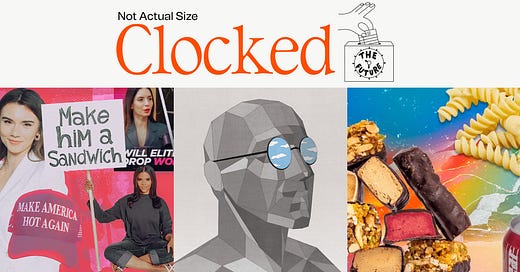The "womanosphere" wants you to be thin, fertile, and submissive
Unfortunately that is not a joke!
What’s in store
FYI, you could be renting out your headbands
Seen on Wired
Platforms like Pickle and Yoodlize are redefining ownership by enabling peer-to-peer rentals of everyday items, from dresses to lawnmowers. These apps cater to environmentally conscious Millennials and Gen Zers seeking extra income, with power users earning up to $36,000 annually. While they promote circular fashion and reduce overconsumption, challenges persist, including size inclusivity and logistical hassles. As financial pressures and hustle culture grow, will we see more young people monetising their closets on the rental market?
On beauty
The “womanosphere” has arrived
Seen on The Guardian
The rise of the “womanosphere” – a network of conservative media voices like Brett Cooper, Candace Owens, and Evie magazine – repackages traditional gender roles for a Gen Z audience, promoting ideals of thinness, fertility, and submission as aspirational. While these platforms claim to empower women through “choice,” they often reinforce Eurocentric beauty standards and rigid domestic roles. At first glance, it would be easy to dismiss this with an eye-roll, but there’s a more complicated tension just below the surface: as young women navigate economic precarity and identity politics, some find comfort in prescriptive narratives that promise clarity, even if it limits their autonomy.
Micro-trend moment
Labubu dolls are the latest sensation
Seen on The New York Times
The rise of toys like Labubu dolls, Sonny Angels, and Jellycats feels like a final goodbye to the boring beige of the 2010s, as adults are now seeking comfort and identity through colourful, whimsical objects. A key part of keychain culture, these toys have become popular on the runway, too. Frequently referred to as a way of healing the inner child with the excitement of blind boxing, these small collectibles might offer nostalgia and emotional solace – but where’s the line between genuine self-care and unnecessary consumerism?
Hi, tech
Befriending a GPT
Seen on Harvard Business Review
Generative AI is firmly integrated into daily life, with custom GPTs tailored for therapy and companionship leading the way. These AI tools offer accessible support, providing emotional check-ins and personalised coping strategies, especially for those facing barriers to traditional mental health care. However, reliance on AI for emotional support is a slippery slope – especially when we know that social connection soothes a range of mental health conditions. There’s real potential for brands to create resources, IRL spaces, and communities to meet the need that AI is currently (and unfortunately) filling.
A last word
Nature’s protein bar is literally just an egg
Seen on The Hustle
The surge in protein-labeled products – from Tesco's simple two-egg "protein pot" to Khloé Kardashian's Khloud Protein Popcorn – shows no signs of slowing down. While this caters to health-conscious shoppers seeking convenient, nutritional snacks, it also raises concerns about "protein-washing," where the wellness halo of protein is used to market ultra-processed foods. In the era of harmful health misinformation, consumers are incredibly vulnerable to unclear messaging and questionable nutritional claims. As we learn to navigate this landscape, who will come out on top? Ultra-processed protein bars or nature’s original protein source: the humble egg?









